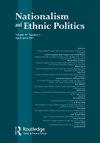乌克兰克里米亚:作为多元化制度化的平滑边缘
IF 1.1
Q3 ETHNIC STUDIES
引用次数: 0
摘要
从20世纪90年代初开始,乌克兰克里米亚似乎面临着俄罗斯多数人的分离主义倾向和前被驱逐的克里米亚鞑靼人的深远政治主张。然而,半岛的自治地位确保了大约19年的民族政治稳定,本文考虑了建立的多样性治理制度如何有助于自治的持久性。作者的结论是,这种制度不符合权力分享等群体间平衡的解释框架。确保持久性的因素包括官方叙述的模糊性,鼓励机会主义行为的松散形式化参与机制以及维持精英和人口群体的期望。本文章由计算机程序翻译,如有差异,请以英文原文为准。
Crimea in Ukraine: Smoothing the Edges as Diversity Institutionalization
Abstract From the early 1990s, Ukrainian Crimea seemed to face the Russian majority’s separatist inclinations and far-reaching political claims of the formerly deported Crimean Tatars. Nevertheless, the peninsula’s autonomous status secured ethnopolitical stability for about 19 years, and the article considers how the established regime of diversity governance contributed to the autonomy’s endurance. The author concludes that this regime did not fit into an explanatory framework of inter-group balance, such as power-sharing. Among the factors securing durablity were the ambiguity of official narratives, loosely formalized participatory mechanisms encouraging opportunisic behavior and the maintenace of the elites’ and population segments’ expectations.
求助全文
通过发布文献求助,成功后即可免费获取论文全文。
去求助
来源期刊

Nationalism and Ethnic Politics
ETHNIC STUDIES-
CiteScore
1.30
自引率
0.00%
发文量
30
期刊介绍:
Nationalism & Ethnic Politics explores the varied political aspects of nationalism and ethnicity in order to develop more constructive inter-group relations. The journal publishes case studies and comparative and theoretical analyses. It deals with pluralism, ethno-nationalism, irredentism, separatism, and related phenomena, and examines processes and theories of ethnic identity formation, mobilization, conflict and accommodation in the context of political development and "nation-building". The journal compares and contrasts state and community claims, and deal with such factors as citizenship, race, religion, economic development, immigration, language, and the international environment.
 求助内容:
求助内容: 应助结果提醒方式:
应助结果提醒方式:


